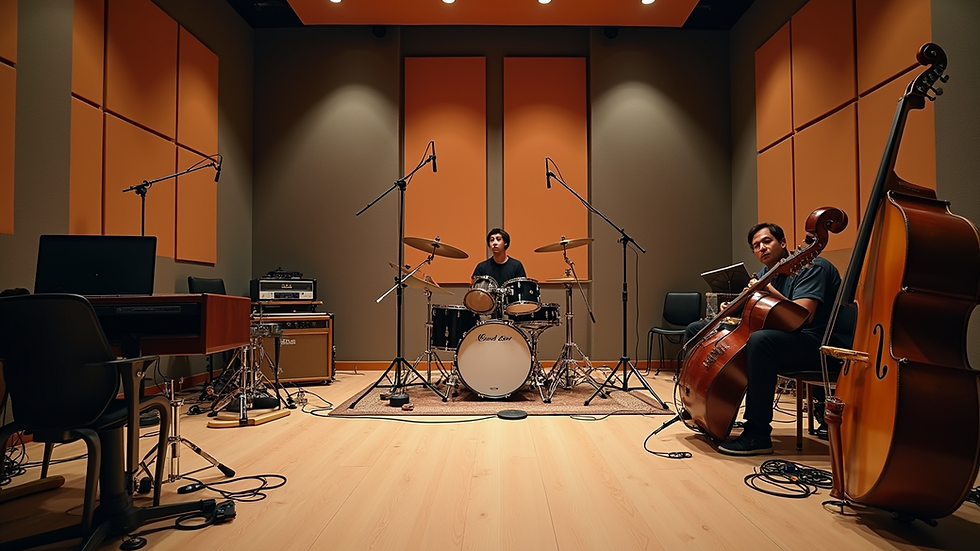Empowering Your Music: Full Song Production Assistance at Your Service
- justin friedman
- Aug 2
- 5 min read
Creating music is a journey filled with passion, creativity, and sometimes, a bit of confusion. Whether you are a seasoned artist or just starting out, the process of producing a song can feel overwhelming. You might have a melody in your head, but translating that into a polished track can be challenging. This is where full song production assistance comes into play.
In this blog post, we will explore how you can empower your music with professional production help. We will discuss the benefits of working with a production team, the steps involved in the production process, and how to find the right assistance for your needs.
The Importance of Song Production
Song production is not just about recording sounds. It is about crafting a piece of art that resonates with listeners. A well-produced song can elevate your music to new heights. Here are some reasons why song production is crucial:
Quality Sound: Professional producers have the tools and expertise to ensure your song sounds its best. They can help with mixing and mastering, which are essential for a polished final product.
Creative Input: A good producer can offer valuable feedback and ideas. They can help you refine your vision and bring your ideas to life.
Time-Saving: Producing a song can be time-consuming. By working with a professional, you can focus on your creativity while they handle the technical aspects.
Industry Connections: Experienced producers often have connections in the music industry. They can help you get your music heard by the right people.
Understanding the Production Process
The song production process can be broken down into several key stages. Each stage plays a vital role in creating a final product that you can be proud of. Here’s a closer look at each step:
1. Pre-Production
This is the planning phase. During pre-production, you will work with your producer to outline your song. This includes:
Songwriting: Finalizing lyrics and melodies.
Arranging: Deciding on the structure of the song, including verses, choruses, and bridges.
Rehearsing: Practicing the song to ensure everyone is on the same page.
2. Recording
Once you have a solid plan, it’s time to record. This is where the magic happens. You will typically record:
Vocals: Capturing the main vocal tracks.
Instruments: Recording any instruments that will be part of the song.
Additional Elements: Adding layers like harmonies, backing vocals, or sound effects.
3. Mixing
After recording, the next step is mixing. This involves balancing all the elements of the song. A good mix will ensure that:
Levels: Each instrument and vocal is at the right volume.
Effects: Adding reverb, delay, or other effects to enhance the sound.
Panning: Placing sounds in the stereo field for a fuller experience.
4. Mastering
The final step is mastering. This is where the song is polished for distribution. Mastering ensures that:
Consistency: The song sounds good on all playback systems.
Loudness: The track is at an appropriate volume compared to other songs.
Final Touches: Any last-minute adjustments are made to enhance the overall sound.
Finding the Right Production Assistance
Now that you understand the production process, how do you find the right assistance? Here are some tips to help you choose the best production team for your needs:
1. Research
Start by researching local producers or production companies. Look for those who specialize in your genre of music.
2. Listen to Their Work
Check out samples of their previous work. This will give you an idea of their style and whether it aligns with your vision.
3. Ask for Recommendations
Talk to other musicians or industry professionals. They may have recommendations based on their experiences.
4. Set Up Meetings
Once you have a shortlist, set up meetings with potential producers. Discuss your vision and see if you feel a connection with them.
5. Budget Considerations
Be clear about your budget. Production costs can vary widely, so it is important to find someone who can work within your financial constraints.
The Benefits of Collaboration
Working with a producer can be a collaborative experience. Here are some benefits of collaboration:
Fresh Perspectives: A producer can bring new ideas to the table, helping you see your music in a different light.
Skill Sharing: You can learn from each other. A producer may teach you about the technical aspects of music production.
Support System: Having someone to bounce ideas off can be incredibly helpful. It can also reduce the stress of the production process.
Empowering Your Music with Technology
In today’s digital age, technology plays a significant role in music production. Here are some tools that can empower your music:
1. Digital Audio Workstations (DAWs)
DAWs like Ableton Live, Logic Pro, and Pro Tools are essential for recording and editing music. They offer a range of features that can help you create professional-quality tracks.
2. Virtual Instruments
Virtual instruments can add depth to your music. They allow you to experiment with different sounds without needing to hire musicians for every part.
3. Plugins
Plugins can enhance your sound. From effects to virtual instruments, they can help you achieve the sound you are looking for.
4. Online Collaboration Tools
With the rise of remote work, online collaboration tools have become invaluable. Platforms like Splice and Soundtrap allow you to work with producers and musicians from anywhere in the world.
Real-Life Success Stories
To illustrate the power of song production assistance, let’s look at a few success stories:
Example 1: Independent Artist Breakthrough
An independent artist named Sarah had a dream of releasing her first album. She had written several songs but struggled with the production side. After seeking help from a local producer, they worked together to refine her sound. The result was a polished album that gained traction on streaming platforms. Sarah’s music reached a wider audience, and she was able to book gigs and grow her fan base.
Example 2: Genre Fusion
A band called The Sound Explorers wanted to experiment with blending genres. They approached a producer known for his work in multiple styles. Together, they created a unique sound that combined rock, jazz, and electronic elements. The collaboration not only resulted in a successful album but also opened doors for the band to perform at various festivals.
Tips for a Successful Production Experience
To ensure a smooth production process, consider these tips:
Be Open to Feedback: Constructive criticism can help you grow as an artist. Be willing to listen to your producer’s suggestions.
Communicate Clearly: Make sure to express your vision and expectations. Clear communication is key to a successful collaboration.
Stay Organized: Keep track of your ideas, lyrics, and recordings. Staying organized will help the production process run smoothly.
Enjoy the Process: Remember that creating music should be fun. Embrace the journey and enjoy the experience of bringing your music to life.
The Future of Your Music Journey
As you embark on your music production journey, remember that you are not alone. With the right assistance, you can turn your ideas into reality. Whether you are looking for a producer to help you refine your sound or simply need guidance through the production process, there are resources available to support you.

Empowering your music is about finding the right tools and support to help you succeed. With dedication, creativity, and the right production assistance, you can create music that resonates with listeners and stands out in the industry.
So, take that leap, reach out for help, and let your music shine. The world is waiting to hear what you have to say.


Comments